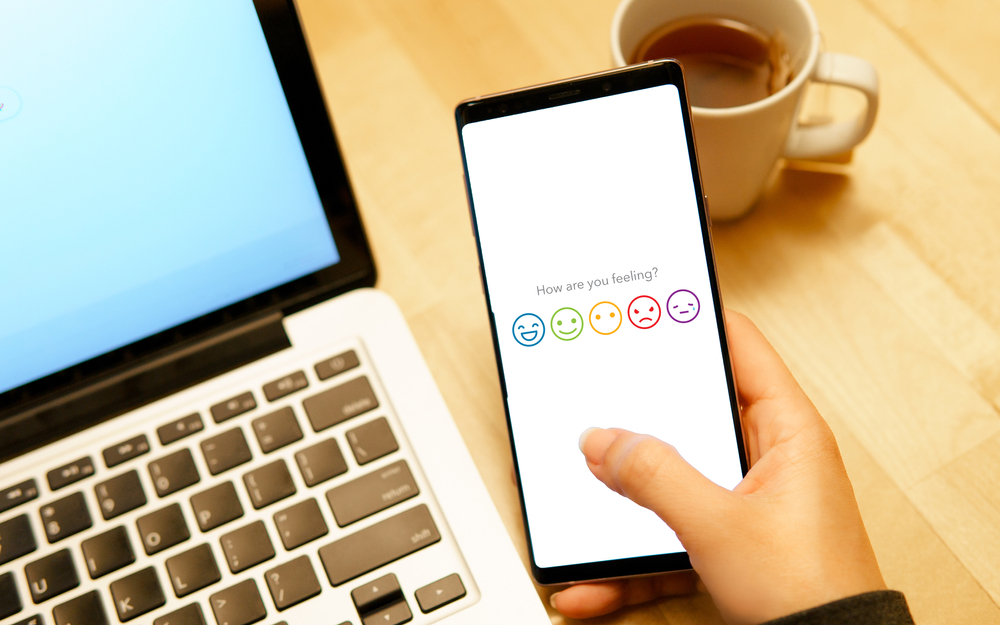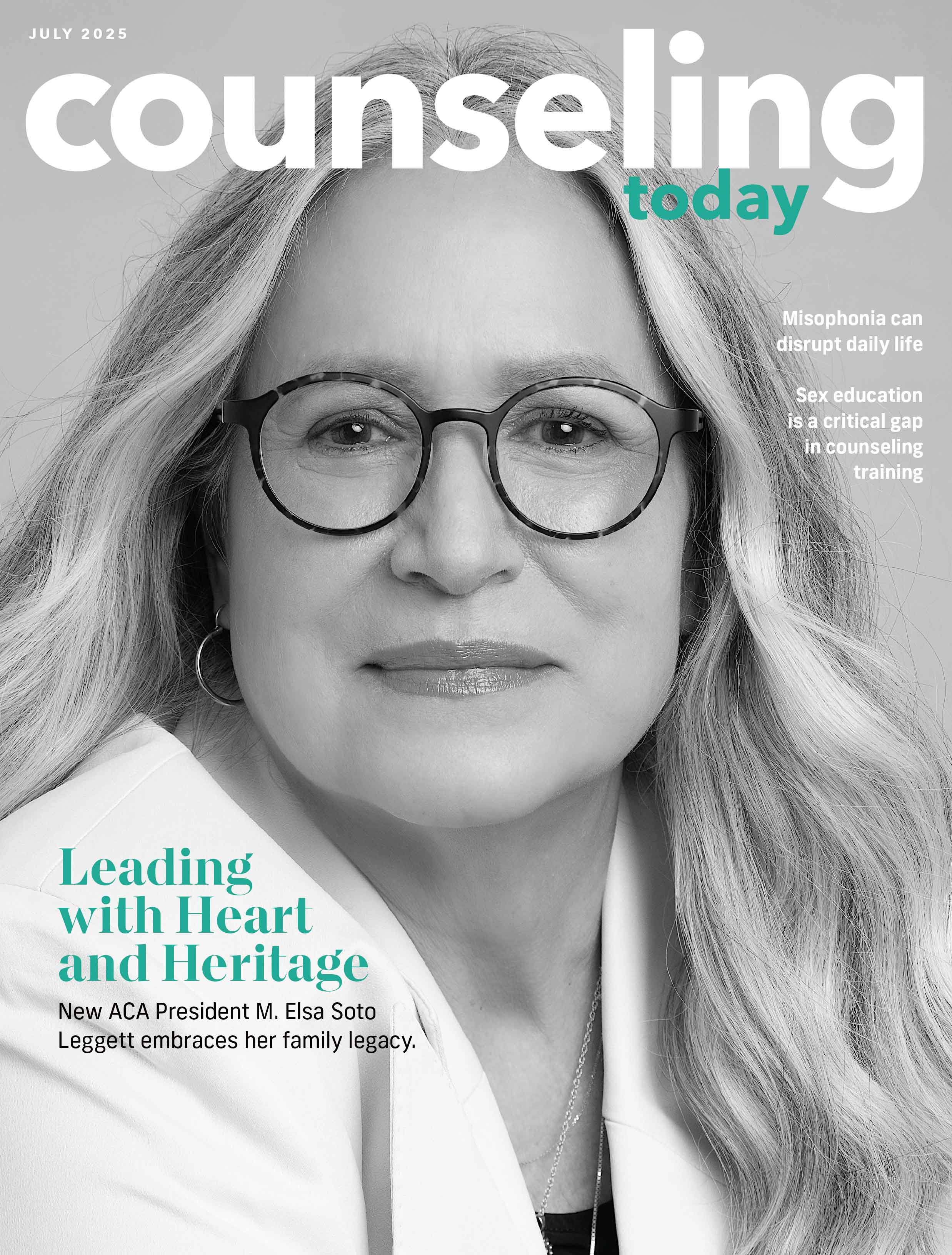Mental health apps as therapeutic tools
By Lisa R. Rhodes
April 2023

Many people today rely to some degree on apps in their efforts to establish a sense of personal wellness. This has led some professional counselors to consider the use of select mental health apps with clients to help them reduce stress and counter their negative thoughts and emotions.
Jennifer Hart, a licensed professional counselor (LPC) in Wyncote, Pennsylvania, and Sarah Barry, a licensed clinical professional counselor in Butte, Montana, are using mental health apps both virtually and in person with their clients.
Hart believes “the possibilities are endless” in using these digital resources as supplemental tools in clients’ journey of mental health and recovery.
“Whenever someone is trying to implement change into their life, the easier it is to access the information, the more likely it is that a client will do the homework or work on implementing the changes,” she says. “No one wants to jump through hoops to do hard work. But if you can easily access items to help you do the work behaviorally, it’s more likely to get done.”
Security precautions
In their book Doing Counseling: Developing Your Clinical Skills and Style, published by the American Counseling Association earlier this year,Jude T. Austin ll and Julius A. Austin, advise counselors to “choose apps that can properly secure client data and support therapeutic options that are based on scientific evidence while also upholding ethical standards of conduct.”
Hart, who works at McPherson Clinical and Counseling Services, says her clients use a variety of apps, including Calm, Headspace, Mindfulness Bell, Word Search, Adult Coloring, Sparkle, Kindle and Audible, to help them manage their anxiety and depression or to assist them with emotional regulation and lifestyle changes. However, Hart uses mental health apps with her clients selectively and ensures that she makes careful notations concerning what mental health concerns she and the client are working on by using the app. She also notes how the app fits into a client’s overall treatment plan.
Hart’s clients largely report that they enjoy using these apps because of their accessibility, which factors in to helping some clients make progress in their therapeutic outcomes.
“Clients report feeling better, [having] less symptoms of anxiety, better sleep, better relationships and [a] better quality of life,” she notes.
Supplemental tools
Barry, owner of Mountain of Hope Counseling LLC, uses the CBT Thought Diary app to help raise clients’ awareness of their thoughts, emotions and behaviors. The app assists clients with reducing their stress levels, tracking their moods and changing negative thought patterns.
Among the tools the app provides is a thought log that allows clients to type in whatever thoughts they are having throughout the day. Barry and the client will then review the log in session and discuss whether they notice any connections between the client’s thoughts and their feelings of anxiety or depression.
Barry says the CBT Thought Diary app is helpful because clients can use it on their own time and whenever they feel triggered by an emotion.
The Calm app is also beneficial for clients who are experiencing depressive symptoms, Barry notes, because it helps them incorporate mindfulness and breathing exercises into their day.
“In my experience, someone who is struggling with depression also shows features of anxiety, so if a person is able to utilize deep breathing exercises with calm meditation, they are able to learn to cope in the moment without having these emotions build up and [having to] wait to process it all during their therapy appointments,” Barry explains. “It enables the individual to work toward their own healing, which builds self-esteem and resilience.”
Jessica Eiseman, an LPC supervisor at Ajana Therapy and Clinical Services in Houston, says mental health apps can be useful tools in either in-person or online therapy. However, she emphasizes that they are only tools and should not be used as a substitute for actual therapy.
“These should be supplemental to the work someone is already doing with a counselor,” Eiseman says. “Without the guidance of trained mental health professionals, like counselors, information can be misused or misinterpreted.”
For example, Eiseman says that while a meditation app may help to reduce some symptoms of certain mental health disorders or provide some temporary relief, it is unlikely to treat the totality of the client’s symptoms.
The Austins say that using extra online resources with clients can be helpful to create visuals, watch videos, listen to music, draw live genograms and draw cybernetic patterns. But they remind counselors that “the point of a technique is to transcend the technique.”
“If we want a client to process grief, using an app is not going to help them process grief,” the Austins stress in a joint email response to Counseling Today. “It may assist, but the processing needs to take priority. The dangers are when counselors become reliant on apps or technology to do the work. This is the same with any intervention. What makes the Myers-Briggs [Type] Indicator so effective is not the assessment itself, but the processing afterward. The same is true for apps in session.”
////
The following resources may be helpful for counselors who would like to learn more about mental health apps and issues of privacy and security:
- American Psychiatric Association’s App Adviser Initiative
- Mozilla Foundation’s mental health apps privacy and security guide
- “Peace of mind: Evaluating the privacy of mental health apps” by Stephanie Nguyen, Bobby Richter, Justin Brookman and Bill Fitzgerald, Consumer Reports Digital Lab, 2021
Read more on telebehavioral health and clinical practice in Counseling Today’s April cover story.
Lisa R. Rhodes is a senior writer at Counseling Today. Contact her at lrhodes@counseling.org.
The views expressed in Counseling Today are those of the authors and contributors and may not reflect the official policies or positions of the editors or the American Counseling Association.


